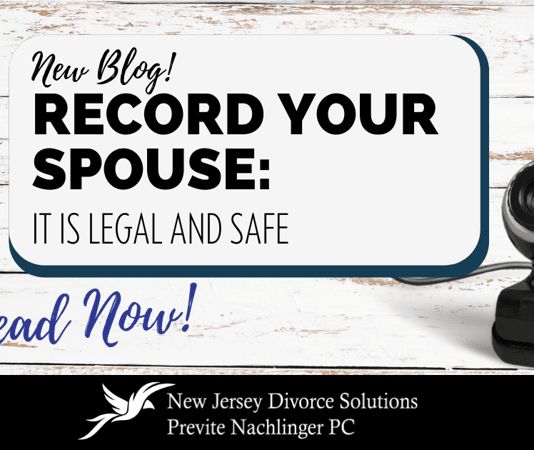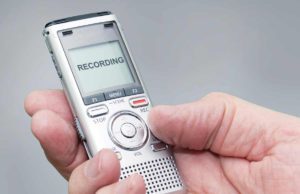RECORD YOUR SPOUSE: IT IS LEGAL AND SAFE

 Record your spouse? Is that what the title said? Yes! The best advice that we give our clients, who live with a spouse they are divorcing, is to record any and all interactions you have with them. Protect yourself from allegations that can escalate your legal fees, prolong your divorce and inflect significant emotion anguish.
Record your spouse? Is that what the title said? Yes! The best advice that we give our clients, who live with a spouse they are divorcing, is to record any and all interactions you have with them. Protect yourself from allegations that can escalate your legal fees, prolong your divorce and inflect significant emotion anguish.
THE LAW.
Let’s start with the law. The New Jersey Wiretapping and Electronic Surveillance Act governs how you can record your spouse. New Jersey is a what is commonly called a “one-party consent” state, meaning that you only need the consent of one person in a conversation to record it. Put another way, if you are part of the conversation, whether in-person or over the phone, you can record the conversation without the other person(s) being aware that you are doing so. Now, if you record your spouse to use as blackmail, that is not okay. Again, think of this as protecting yourself from false allegations.
On the other hand, leaving a recorder on the counter so you can try to record your spouse having a phone call with his or her attorney while you go to work is generally not legal and could have significant legal consequences. There are some exceptions to this general rule if there is not consent of one party, but you should only record if you or someone that is part of the recording has given you explicit consent to record, to ensure you do not end up being accused of a felony.
WHAT IS INCLUDED IN THE LAW?
Interestingly, videotaping and photography are not included in the wiretapping law. In fact, as a general matter, it is legal to videotape and take pictures of anyone who is in a public area. The concept really resolves around whether someone has a reasonable expectation of privacy. Now, please understand that videotaping your spouse having an affair is not legal and can get you into serious trouble. The purpose of our conversation here is to protect you, not try to get information to harm your spouse.
WHAT SHOULD YOU RECORD YOUR SPOUSE?
What are you protecting yourself from? Unfortunately, the most common legal issue that suddenly arises in divorce is alleged domestic violence. These allegations are sometimes raised because there is a serious domestic violence situation and someone needs protection from assault, threats or severe harassment. However, more often the allegations are false or highly exaggerated, made with the purpose to remove someone from the marital home or get an upper hand in a custody fight. Given that the number one reason for a restraining order is something that a spouse allegedly said, ensuring you protect yourself with evidence of what actually happened is important. Therefore, the number one piece of advice we can give you is to record your spouse when you are having conversations with him or her. Don’t think it won’t happen to you! Hope for the best, but plan for the worst.
Have questions? Schedule a consultation with one of our attorneys by calling us at (732) 479-4711
or . We will not tell you what you want to hear. We will tell you what you need to know.
